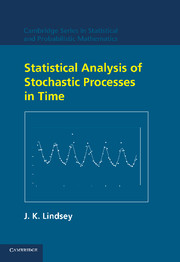2 - Basics of statistical modelling
Published online by Cambridge University Press: 03 February 2010
Summary
In this chapter, I shall review some of the elementary principles of statistical modelling, not necessarily specifically related to stochastic processes. In this way, readers may perhaps more readily understand how models of stochastic processes relate to other areas of statistics with which they are more familiar. At the same time, I shall illustrate how many of these standard procedures are not generally applicable to stochastic processes using, as an example, a study of the duration of marriages before divorce. As in subsequent chapters, I shall entertain a wide variety of distributional assumptions for the response variable and use both linear and nonlinear regression functions to incorporate covariates into the models.
Descriptive statistics
Let us first examine the data that we shall explore in this chapter.
Divorces Marriage may be conceptualised as some kind of stochastic process describing the relationships within a couple, varying over time, that may eventually lead to rupture. In this light, the process ends at divorce and the duration of the marriage is the centre of interest.
In order to elucidate these ideas, a study was conducted in 1984 of all people divorcing in the city of Liège, Belgium, in that year, a total of 1727 couples. (For the data, see Lindsey, 1992, pp. 268–280). Here, I shall examine how the length of marriage before divorce may vary with certain covariates: the ex-spouses' ages and the person applying for the divorce (husband, wife, or mutual agreement).
Only divorced people were recorded, so that all durations are complete. However, this greatly restricts the conclusions that can be drawn. Thus, the design of this study makes these data rather difficult to model.
Information
- Type
- Chapter
- Information
- Statistical Analysis of Stochastic Processes in Time , pp. 18 - 36Publisher: Cambridge University PressPrint publication year: 2004
